[Review] Emio – The Smiling Man: Famicom Detective Club
System: Switch
Release date: August 29, 2024
Developer: Mages / Nintendo
Publisher: Nintendo
I like it when Nintendo gets weird. It’s usually at about this point in their consoles’ lifespans, well after they’ve sold roughly a bajillion Mario and Zelda titles, when we see them start to resurrect dormant franchises and experiment in genres that other platform holders are ignoring. So, here we are – it’s 2024, and Nintendo decided now is the perfect time to release a new entry in in the Famicom Detective Club series of visual novels, which hasn’t seen a new entry in 27 years. Emio – The Smiling Man has some compelling ideas driving its core mystery about a serial killer with an unsettling modus operandi, and initially, it had hooked. Unfortunately, this story’s lethargic pacing, tedious writing, and general lack of meaningful character development fails to live up to the high bar set by earlier entries in the series.
The Famicom Detective Club games are something of outliers in the modern visual novel scene. While they don’t necessarily have the robust gameplay and branching narratives of something like a Zero Escape game, they’re also not quite kinetic experiences, either. Instead, the Famicom Detective Club games play like traditional Japanese adventure visual novels with a command menu that affords the player a limited means of interacting with their surroundings while reading through the narrative. I thoroughly enjoyed my time spent with the 2021 remakes of the first two games in the series; despite the fact that the outcomes of those stories were predetermined, the way the mysteries unraveled really had me on the edge of my seat from start to finish. Needless to say, I had high hopes that a new entry in the franchise would be able to up the tension, storytelling and interactivity even further.
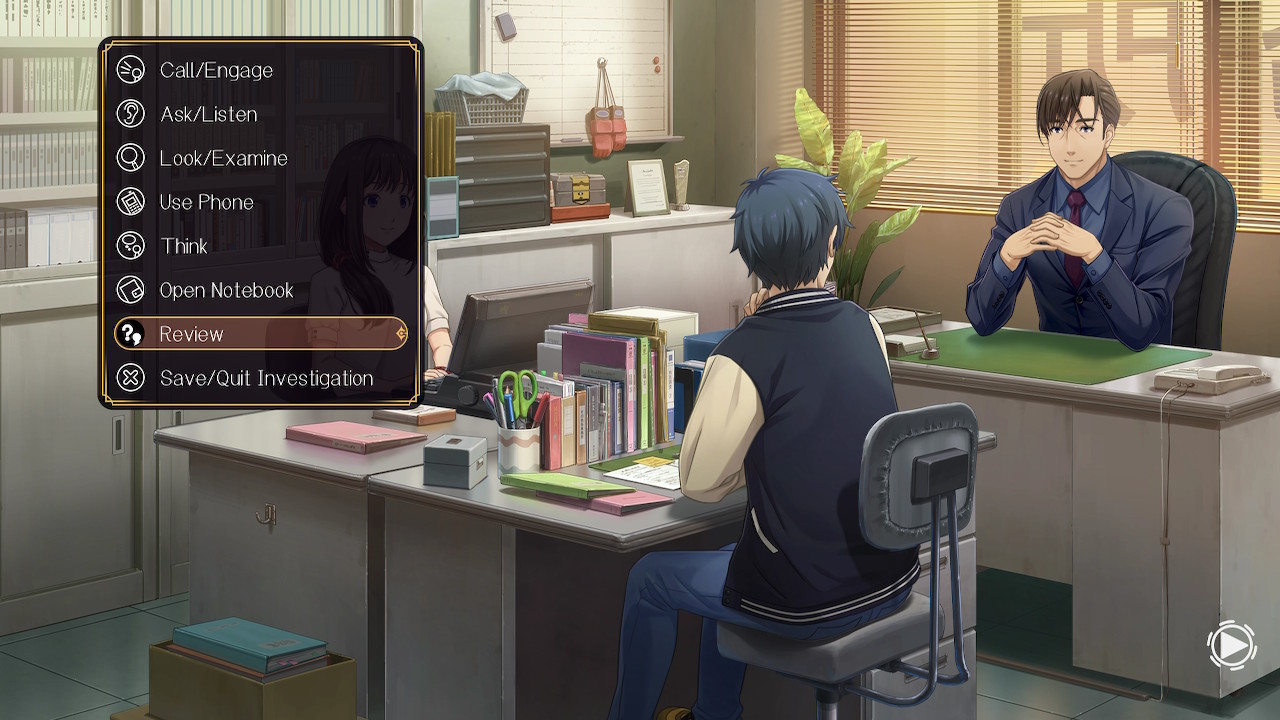
As I reflect back on my time spent with Emio – The Smiling Man: Famicom Detective Club (which I’ll simply refer to as Emio – The Smiling Man moving forward), I find myself very conflicted about the experience as a whole. It’s difficult to reconcile this narrative’s incredibly compelling beginning and ending with the generally middling 1o hours of writing that’s sandwiched between it. The case kicks off with a bang – in this case, with the brutal murder of a junior-high student – and the ending, which I won’t spoil, is nail-bitingly tense and wonderfully executed. Disappointingly, the reality is that for most of Emio – The Smiling Man’s narrative, shockingly little actually happens. The result is that moment-to-moment, the plot often felt quite dull and uneventful.
If I’m being generous, this game is probably a more accurate reflection of the day-to-day detective experience than most other murder mystery stories out there. You spend a lot of time interviewing people associated with the murder victims, trying to find new leads. At one point you’re literally in a library, reading through newspaper archives to try and find connections with similar murders that happened eighteen years prior. You occasionally take to the streets to try and get passersby to chat with you, maybe by showing them a sketch of a suspect to see if they’ll recognize them. Sure, maybe it’s not the most action-packed experience, but that’s fine; I can buy into the concept of a slow-burn mystery if the rest of the elements of a strong story are there.
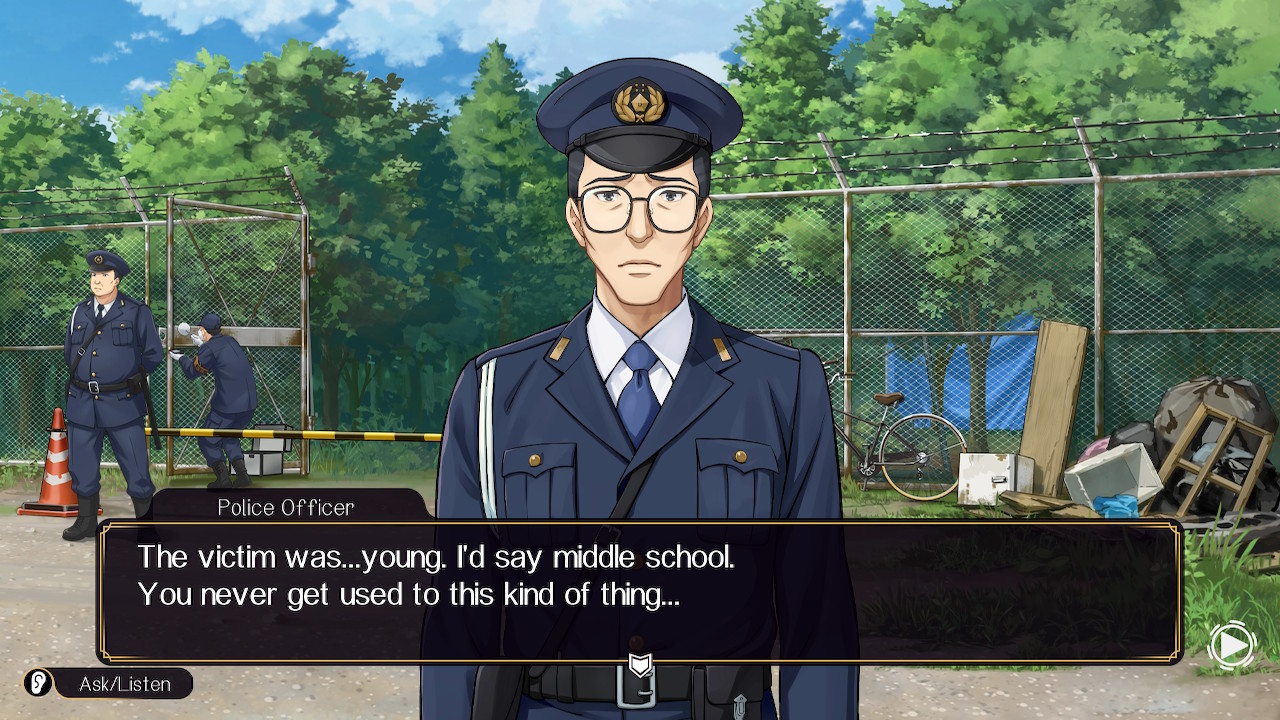
Unfortunately, that’s where a lot of Emio – The Smiling Man falls short for me. The first two games in the series were strengthened by not just having the player solve a mystery, but also by exploring the backgrounds of the two protagonists: our unnamed male protagonist (I’ll call him Boy Detective, since that’s what other characters say) and his partner, Ayumi. In the earlier games, the player really gets to connect with these characters, watch them grow and see their relationship evolve. But in Emio – The Smiling Man, Boy Detective and Ayumi spend very little time interacting, as they’re mostly pursuing different leads in different locations. As a result, neither of them really develop or change, which is a shame. There was a real opportunity to explore a deeper friendship or romantic relationship between these characters, or perhaps how they are reconciling with some of the traumatic situations they experienced in the first two games. Instead, it often feels like these characters barely know each other. I understand that the writers may have wanted this game to be a standalone tale and thus friendlier to newcomers, but as a fan of the series, it was a disappointing shift.
That aside, I entered this experience with the intent to let myself get absorbed by the mystery. The general premise of Emio – The Smiling Manis that eighteen years ago, there were a series of murders in which children were strangled by an unsettling figure – a man who was rumored to wear a paper bag over his head with a creepy smiling face drawn on it. The police were never able to solve the case, but it became an urban legend. When a similar murder occurs in the present day, the police decide to reopen the case and bring in the Utsugi Detective Agency to assist. It’s a strong enough scenario, and the opening chapter or two has fairly tight pacing that did a solid job at making me want to see more.
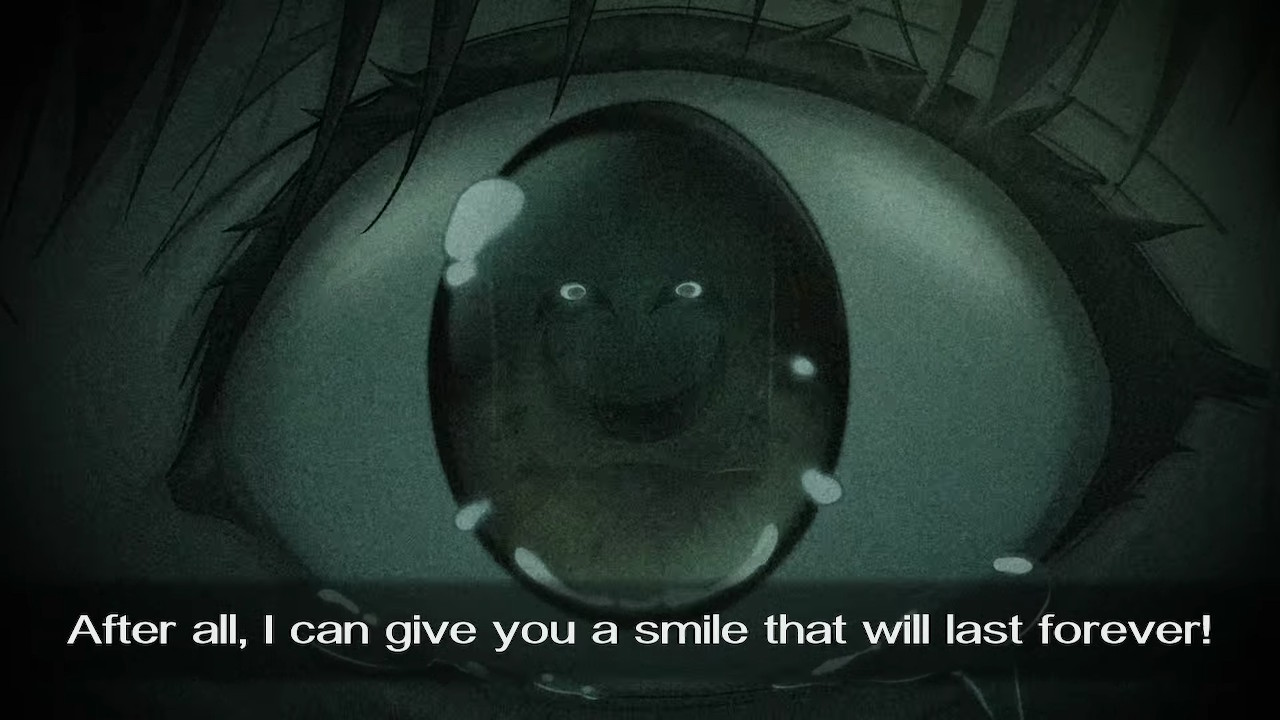
Unfortunately, most of what follows is just significantly more plodding and dull than I had hoped. I credit most of this to the game’s pacing, which is slower than molasses. You get to visit thrilling locations like… a retirement home! And… a coffee shop (multiple times)! Then, you get to sit down and talk with characters who more often then not will tell you things you’ve already been told, or helpfully share deductions you’ve already made. An example: at a certain point in the game, it’s been well established that one of the murder victims was a great student, who was well liked by everyone, but that his grades had been slipping lately. Okay, sure. That could be relevant information. You hear it once, and it gets added to your in-game notebook, so at that point there’s no need to keep track of it and we can move on, right? Wrong. Be prepared to hear well-established facts – things that both you and the protagonist have been aware of for multiple chapters – repeated ad nauseam. Then, be prepared to hear Boy Detective’s internal monologues repeat the same information, again. Then, be prepared to review all the facts of the case at the end of the day, again.
When I was a student, some of the earliest advice I received for writing fiction was “show, don’t tell.” This game does not, generally speaking, do that. There are occasional flashbacks that do provide an opportunity to visualize events that had occurred previously and that might be relevant to the case. But more often then not, I spent the bulk of my time sitting stationary in milquetoast locations, listening to characters telling me things I already knew.
The previous games in the Famicom Detective Club series did a better job creating a sense that the mystery being solved was an active case, where the stakes were high and the pressure was real. Instead, Emio – The Smiling Man feels like doing homework for the police. That feeling is exasperated by the fact that not only do the police have a lot more information than the protagonists do, but that they constantly remind Ayumi and Boy Detective of that fact and refuse to help them since they’re from an outside detective agency. What this mean’s for the game’s narrative is that the case probably would have eventually been solved by the police without getting the protagonists involved at all, something that the game’s ending makes even more apparent. It’s a weird way to tell a detective story, and it didn’t really work for me.
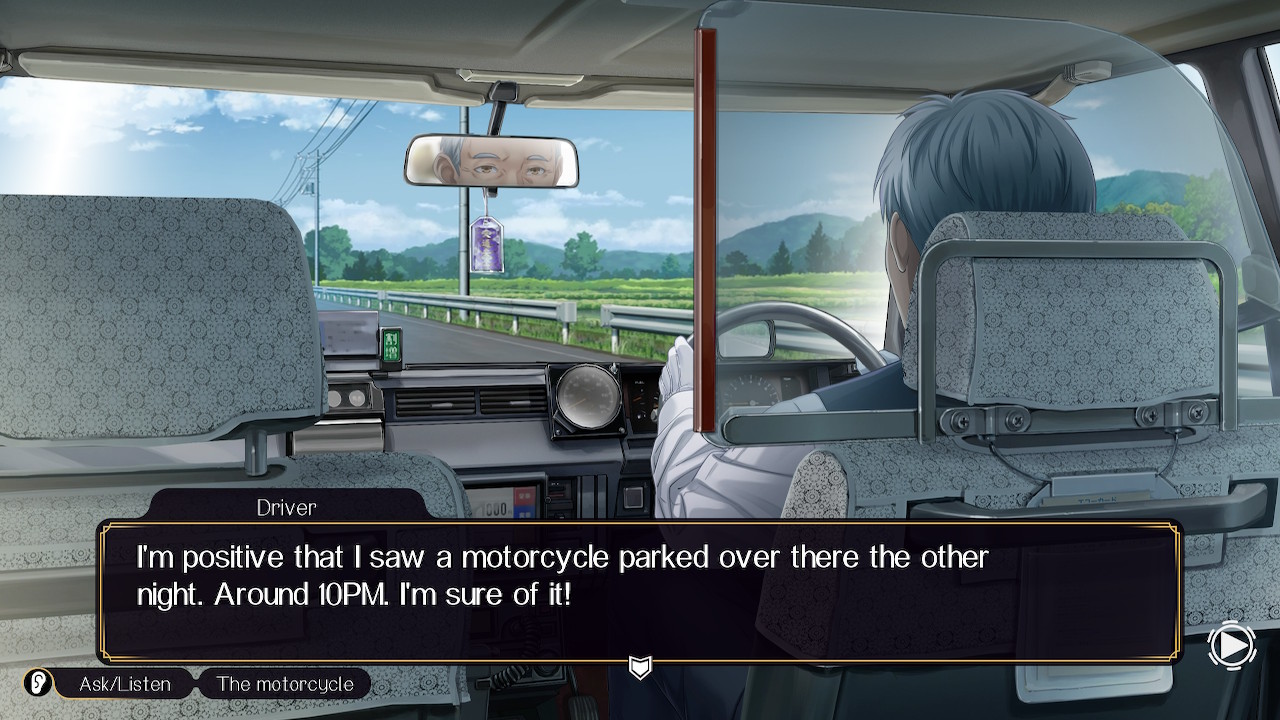
This sense of meandering is heightened by the fact that I found this game to be more streamlined and less interactive than the 2021 remakes of The Missing Heir and The Girl Who Stands Behind. In those games, you had to think a bit more about which location to go to next, and once you were there, how you could interact with your surroundings to unlock the next course of action. Emio – The Smiling Man generally leaves that behind until the last few chapters of the game. Again, that’s not inherently bad – some may even see this as a good thing, as an attempt to remove some of the frustrating guesswork and questionable logic of the first two games. What bothers me is that instead of introducing more intuitive puzzles and exploration, the developers chose to focus this game almost entirely around having conversations. That might have worked if, again, the conversations were more interesting – but oftentimes, they’re just not.
In fairness, there are a few characters who Ayumi and Boy Detective interact with that I did enjoy getting to know over the course of my adventure. Several characters are set up in a way that left me at least mildly suspicious of them, and as such, genuinely wanting to learn more about them. Is Fukuyama really just an excitable, somewhat overbearing school teacher with a genuine interest in his students’ well-being… or is he a possible suspect? Is detective Kamihara’s kindness and sense of humor a possible cover for something more sinister? And what about Detective Kuze? She’s brash and reserved… but why? I won’t spoil the answers to any of these questions, because frankly, they’re often more interesting than solving the ongoing mystery. While scenes with these individuals would often drag on longer than I felt was necessary, I generally enjoyed my time chatting with them.
Emio – The Smiling Man also retains the very strong presentation of the Famicom Detective Club remakes. In addition to having incredibly detailed character art and environments, those games also used animation in a way that few visual novels do, transforming what could have been static scenes into something that felt dynamic. Emio – The Smiling Man’s character art is similarly excellent; characters’ facial expressions change as they react to the conversations they’re having, and occasionally they’ll even move about the frame a little bit. Environments aren’t quite as interesting as they were in previous games, but there are still subtle touches to them that help them feel more like real places. It can be as subtle as steam coming off the top of a cup of coffee, or clouds moving slowly in the sky, but it adds a lot to the overall feel of the experience.
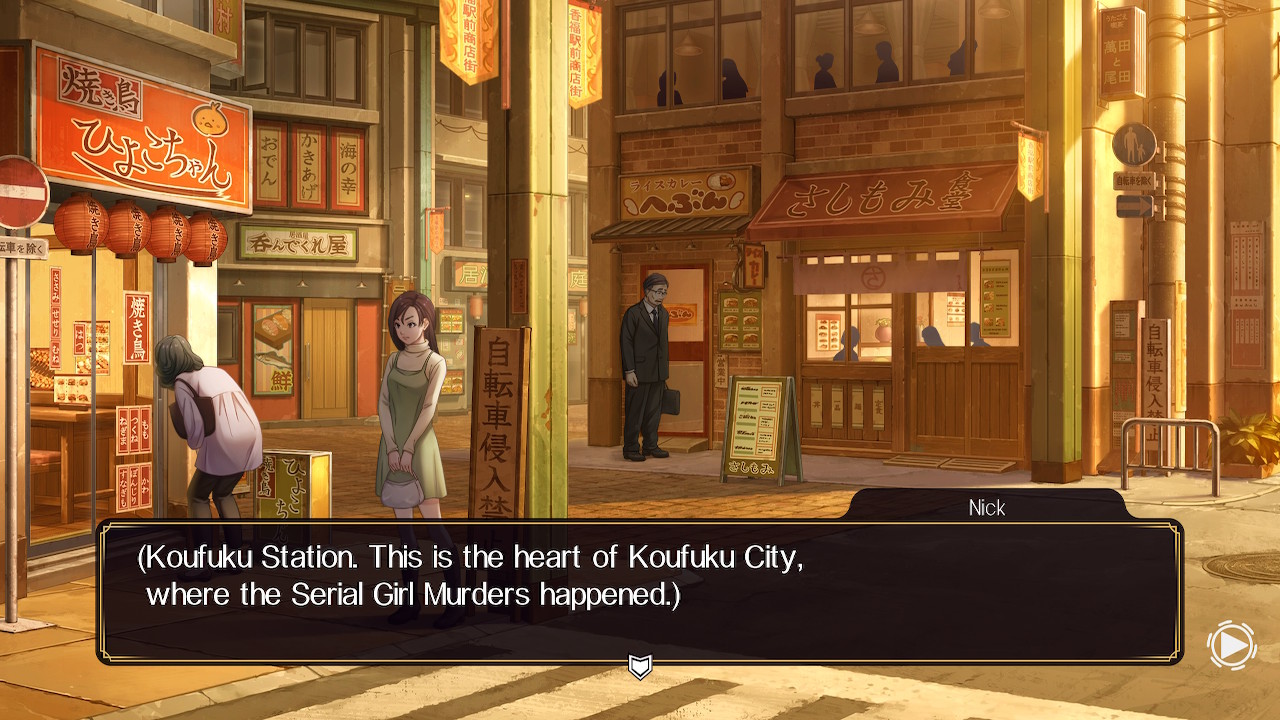
I’m a bit more mixed on the music, which often felt somewhat inappropriate for the tone that the game was trying to put forth. I can understand the logic behind some of it; it makes sense that you’d hear jazz music in a cafe or calm music in a retirement home. But often, that music will carry into flashback sequences, and that’s where things can get weird. Imaging hearing a gut-wrenching story about the disappearance of a young kid, while Kenny G plays in the background, and you’re not far off from the truth. Emio – The Smiling Man has so few moments of real tension as it is, and so having what little bits of that did exist be minimized due to questionable sound design is a real shame.
So, all of this paints somewhat of a bleak picture for Emio – The Smiling Man. For most of my playthrough, frankly, I wasn’t as impressed with this game as I had hoped. But then, something happened that changed my mindset about the experience quite a bit: I finished the game.
Emio – The Smiling Man has an ending sequence that really surprised me. It shattered my expectations for the type of storytelling that I’d ever expect to see from a Nintendo game. I wouldn’t dare spoil it. What I will say is that it’s not merely dark and emotionally nuanced; it depicts the human brain as something that is weak and malleable in a way that completely changes the context of the events that came earlier. It’s a little scary, but more than that, it’s simply sad. I put down the controller, and I was emotionally exhausted. I finally got the answers I had been seeking – the thing that I had wanted the entire playthrough. I had tied a neat little bow on the case; yay, me. But really, I hadn’t done much of anything – I had simply exposed myself to a sad, tragic truth. It’s an ending that, I think, will stick with me for a long time. But is that enough?
The Verdict
If you decide to play Emio – The Smiling Man: Famicom Detective Club, you really need to commit to finishing it – that’s true for a lot of games, but especially this one. At times, doing so was a more difficult prospect then I had hoped; this game struggles greatly with its pacing, writing, and some aspects of its tone. For much of the runtime, I felt like I was doing very little to advance the case and make real progress in solving the mystery, like I was just waiting for something exciting to happen. Even the level of interaction and sleuthing has been cut back more significantly than I had expected. What kept me going was the game’s characters, its generally great presentation, and the hope that at some point, things would get good. Fortunately, they do, and ultimately, I was glad I saw this mystery through to its conclusion. I just wish it hadn’t been as much of a chore to get there.
Emio – The Smiling Man: Famicom Detective Club copy provided by the publisher for the purposes of this review.

